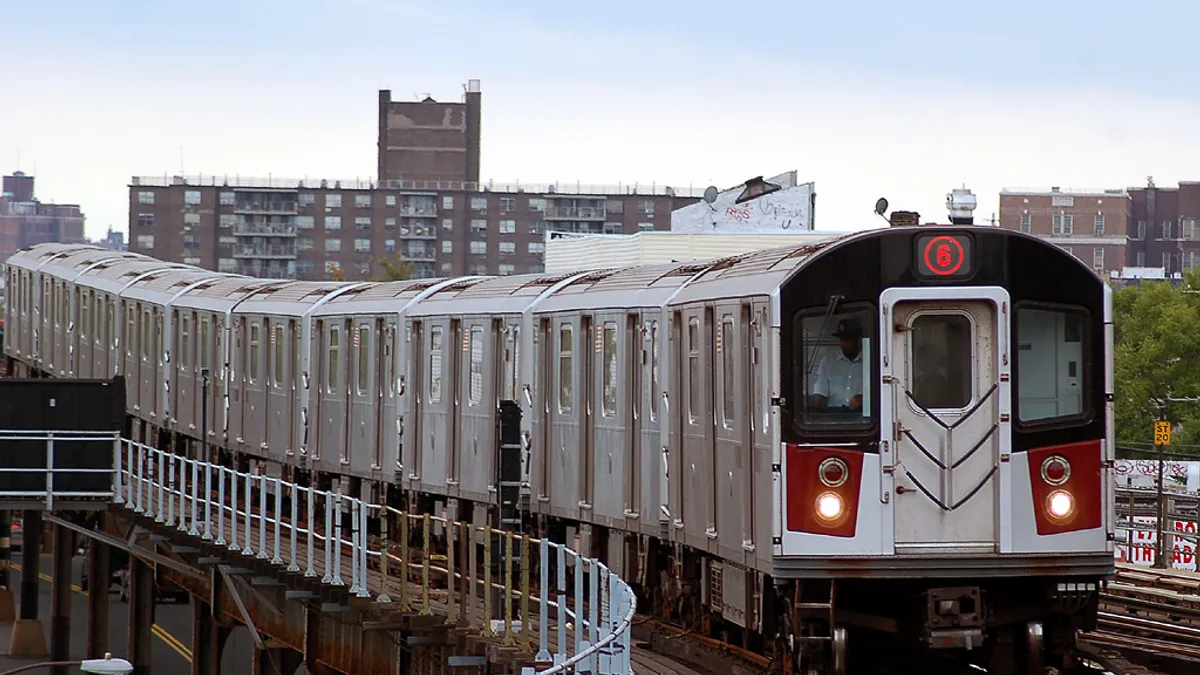Dive Brief:
- Transit advocates have called for a public transportation-focused Green New Deal that would boost federal spending and prioritize maintenance over existing infrastructure projects, as agencies face dual threats of greenhouse gas emissions and the new coronavirus (COVID-19).
- The joint report authored by TransitCenter, Transportation for America, Data for Progress and the Ian L. McHarg Center for Urbanism and Ecology, calls for an annual investment of $50 billion, up from the current number of $13 billion. Of that, $20 billion would go toward operating assistance for transit agencies; $18 billion would be spent on maintenance and $12 billion would be used for expansion projects. The plan would also dedicate 5% of federal highway funding to Complete Streets projects and require states to create a Complete Streets program.
- The coronavirus outbreak has led transit agencies to reduce service and engage in deep cleaning, which underscores the need for more public transit investments. "We don't want to be in a situation where transit agencies feel a lot of pressure to cut service, because we have to maintain those levels of service to maintain transit while allowing social distancing," Steven Higashide, director of research at TransitCenter, said on a call with reporters. "We don't want to see those big cuts. It's becoming really clear that transit agencies, they're going to need financial assistance."
Dive Insight:
Any future stimulus package to reboot the economy after the worst of the coronavirus is over would likely include major infrastructure funding. The authors of this Green New Deal — taking their lead from the Congressional plan that would invest heavily to fight climate change and has inspired city-level efforts — see an opportunity to rethink how transportation is funded.
"We don't have a money problem in transportation, we just have a priorities problem," Emily Mangan, a policy associate at Transportation for America, said during the conference call.
Transit agencies are already feeling the effects of the coronavirus. The Washington Metropolitan Area Transit Authority (WMATA) announced Tuesday it would further cut its operating hours, while the Green Bay, WI Metro announced Sunday it would suspend its service until further notice. Green Bay Mayor Eric Genrich said the city "must err on the side of caution and public safety, as we navigate these uncharted waters."
New York City's Metropolitan Transportation Authority (MTA) has even requested a $4 billion federal bailout as it sees ridership crater, though the MTA said it will not reduce service.
To ease strain, the Federal Transit Administration (FTA) said it would allow increased flexibility for transit agencies to make more of their budgets available for day-to-day operations, but Mangan said Congress will need to act more forcefully to support agencies as they cope with the coronavirus, and then recover from its worst effects.
"This could have a lasting impact of years on transit agencies," Mangan said. "We know that transit service is, and will continue to be, vital and Congress needs to take really strong action to support transit service now. Ensure that transit will be robust and ready when this crisis is over."
The report's authors said there is plenty of support for increased public transit investment. According to their polling of 1,029 U.S. residents, 66% of those surveyed believe communities would benefit from expanding transit; 77% believe the U.S. would benefit overall from expansions; while 79% think the government should focus on fixing existing infrastructure before building new. The online poll was fielded in November.
"People are, and feel, trapped in their cars, and they want more options for how they move through their daily lives," Dr. Billy Fleming, Wilks Family Director at the Ian L. McHarg Center for Urbanism and Ecology, said during the conference call.
To keep up with all of our coverage on how the new coronavirus is impacting U.S. cities, visit our daily tracker.












